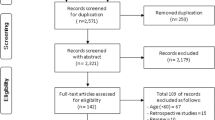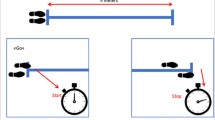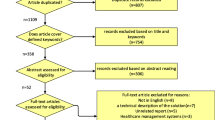Abstract
Objective
This paper describes the trajectories of nutritional status and cognitive impairment and their correlation among older Taiwanese over 1 year after hip-fracture surgery.
Design
Secondary analysis of data from a clinical trial evaluating the effects of three types of post-discharge care for 292 older hip-fracture patients (age >60 years).
Measurements
Nutritional status was assessed by the Mini Nutritional Assessment before and 1, 3, 6, 12 months after hospital discharge. Cognitive function was measured by the Mini-Mental State Examination before surgery, at hospital discharge, 6 and 12 months after discharge. Trajectories of nutritional status and cognitive impairment were depicted by latent class growth modeling, whereas linkages between nutritional-status and cognitive-impairment trajectories were assessed by multinomial logistic regression.
Results
Nutritional status in general improved significantly, particularly during the first 3 months after discharge. We identified three trajectories of nutritional status: malnourished (15.4%), at risk for malnutrition (38.9%), and well-nourished (45.7%). In contrast, cognitive changes followed four largely linear but distinct trajectories: moderately impaired (12.2%), mildly impaired (27.8%), borderline impaired (21.8%), and cognitively intact (38.2%). Trajectories of nutritional status were significantly associated with cognitive-function trajectories. For instance, relative to malnourished patients, well-nourished patients were 95% less likely (OR=0.05, CI =0.01-0.24) to be moderately cognitively impaired.
Conclusion
A good nutritional-status trajectory after hip fracture was associated with better cognitive function. To treat and care for elderly hip-fractured patients, specific interventions need to target those who are malnourished or at risk of malnutrition to decrease their risk for cognitive impairment.







Similar content being viewed by others
References
Liou MJ, Tsai JS, Lin JD. Hip fractures: an increasing geriatric problem in Taiwan. Age Ageing 2001;31:483–490.
Chie WC, Yang RS, Liu JP, Tsai KS. High incidence rate of hip fracture in Taiwan: estimated from a nationwide health insurance database. Osteoporos Int 2004;15:998–1002.
Robbins JA, Biggs ML, Cauley J. Adjusted mortality after hip fracture: from the cardiovascular health study. J Am Geriatr Soc 2006;54:1885–1891.
Shyu, YI, Liang, J, Tseng MY, Li HJ, Wu CC, Cheng HS, Yang CT. Comprehensive care improves health outcomes among elderly Taiwanese patients with hip fracture. J Gerontol A Biol Sci Med Sci 2013;68:188–197.
Wildner M, Clark DE. Hip fracture incidence in East and West Germany: reassessment ten years after unification. Osteoporos Int 2001;12:136–139.
Park HL, O’Connell JE, Thomson RG. A systematic review of cognitive decline in the general elderly population. Int J Geriatr Psychiatry 2003;18:1121–1134.
Williams K, Kemper S. Exploring interventions to reduce cognitive decline in aging. J Psychosoc Nurs Ment Health Serv 2010;48(5):42–51.
Deary IJ, Corley J, Gow AJ, Harris SE, Houlihan LM, Marioni RE, Penke L, Rafnsson SB, Starr JM. Age-associated cognitive decline. Br Med Bull 2009;92:135–152.
Corrêa Leite, MC, Nicolosi, A, Cristina, S, Hauser, WA, Nappi, G. Nutrition and cognitive deficit in the elderly: a population study. Eur J Clin Nutr 2001, 55(12), 1053–1058.
Lee KS, Cheong HK, Kim EA, Kim KR, Oh BH, Hong CH. Nutritional risk and cognitive impairment in the elderly. Arch Gerontol Geriat 2009;48:95–99.
Pearson JM, Schlettwein-Gsell D, Brzozowska A, Van Staveren WA, Bjornsbo K. Life style characteristics associated with nutritional risk in elderly subjects aged 80-85 years. J Nutr Health Aging 2001;5:278–283.
Koren-Hakim T, Weiss A, Hershkovitz A, Otzrateni I, Grosman B, Frishman S, Beloosesky Y. The relationship between nutritional status of hip fracture operated elderly patients and their functioning, comorbidity and outcome. Clin Nutr 2012;31:917–921.
Norman K, Pichard C, Lochs H, Pirlich M. Prognostic impact of disease-related malnutrition. Clinical Nutrition 2008;27:5–15.
Huang TT, Liang SH. A randomized clinical trial of the effectiveness of a discharge planning intervention in hospitalized elders with hip fracture due to falling. J Clin Nurs 2005;14:1193–1201.
Paillaud E, Bories PN, Le Parco JC, Campillo B. Nutritional status and energy expenditure in elderly patients with recent hip fracture during a 2-month follow-up. Br J Nutr 2000;83:97–103.
Chen CC, Schilling LS, Lyder CH. A concept analysis of malnutrition in the elderly. J Adv Nurs 2001;36:131–142.
Meijers JM, van Bokhorst-de van der Schueren MA, Schols JM, Soeters PB, Halfens RJ. Defining malnutrition: mission or mission impossible? Nutrition 2010;26:432–440.
Li HJ, Cheng HS, Liang J, Wu CC, Shyu YI. Functional recovery of older people with hip fracture: does malnutrition make a difference? J Adv Nurs 2013;69:1691–1703.
Bell J, Bauer J, Capra S, Pulle CR. Barriers to nutritional intake in patients with acute hip fracture: time to treat malnutrition as a disease and food as a medicine? Can J Physiol Pharmacol 2013;91:489–495.
Singh MAF (2009) Using exercise as medicine for older adults. In: Arenson C, Busby-Whitehead J, Brummel-Smith K, O’Brien JG, Palmer MH, Reichel W (eds) Reichel’s care of the elderly: clinical aspects of aging, 6th edn. Cambridge University Press, New York, pp 67–78.
Clarke DM, Wahlqvist ML, Strauss BJ. Undereating and undernutrition in old age: integrating bio-psychosocial aspects. Age Ageing 1998;27:527–534.
McMinn J, Steel C, Bowman A. Investigation and management of unintentional weight loss in older adults. BMJ 2011;342: d1732.
Volkert D. Malnutrition in older adults-urgent need for action: a plea for improving the nutritional situation of older adults. Gerontology 2013;59:328–333.
Langsetmo L, Barr SI, Berger C, Kreiger N, Rahme E, Adachi JD, Papaioannou A, Kaiser SM, Prior JC, Hanley DA, Kovacs CS, Josse RG, Goltzman D. Associations of protein intake and protein source with bone mineral density and fracture risk: a population-based cohort study. J Nutr Health Aging 2015;19(8):861–868.
Sotunde OF, Kruger HS, Wright HH, Havemann-Nel L, Kruger IM, Wentzel-Viljoen E, Kruger A, Tieland MJ. Lean mass appears to be more strongly associated with bone health than fat mass in urban black South African women. Nutr Health Aging 2015;19(6):628–636.
Castro-Costa E, Dewey ME, Uchôa E, Firmo JOA, Lima-Costa MF, Stewart R. Trajectory of cognitive decline over 10 years in a Brazilian elderly population: the Bambui Cohort Study of Aging. Cad Saude Publica 2011;27:S345–S350.
Marioni RE, Hout AVD, Valenzuela MJ, Brayne CB, Matthew FE. Active cognitive lifestyle associates with cognitive recovery and a reduced risk of cognitive decline. J Alzheimers Dis 2012;28:223–230.
Chen YJ, Dai YT, Yang CT, Wang TJ, Teng YH. A review and proposal on patient classification in long-term care system. Department of Health. Taipei, Taiwan, R.O.C.; 1995.
Yip PK, Shyu YI, Liu SI, Lee JY, Chou CF, Chen RC. An epidemiological survey of dementia among elderly in an urban district of Taipei. Acta Neurologica Sinica 1992;1:347–354.
Folstein, MF, Folstein SE, McHugh PR. «Mini-mental state». A practical method for grading the cognitive state of patients for the clinician. J Psychiatr Res 1975;12:189–198.
Guigoz Y, Vellas B, Garry PJ. Assessing the nutritional status of the elderly: the Mini Nutritional Assessment as part of the geriatric evaluation. Nutr Res 1996;54:S59–S65.
Jones B, Nagin DS, Roeder K. A SAS procedure based on mixture models for estimating developmental trajectories. Sociol Methods Res 2001;29:374–393.
Nagin DS. Group-based modeling of development. Harvard University Press, Cambridge, MA; 2005.
Jung T, Wickrama KAS. An introduction to latent class growth analysis and growth mixture modeling. Soc Personal Psychol Compass 2008;2:302–317.
Juliebø V, Bjøro K, Krogseth M, Skovlund E, Ranhoff AH, Wyller TB. Risk factors for preoperative and postoperative delirium in elderly patients with hip fracture. J Am Geriatr Soc 2009;57:1354–1361.
Dolan MM, Hawkes WG, Zimmerman SI, Morrison RS, Gruber-Baldini AL, Hebel JR, Magaziner J. Delirium on hospital admission in aged hip fracture patients: prediction of mortality and 2-year functional outcomes. J Gerontol A Biol Sci Med Sci 2000;55:M527–M534.
Yaffe Y, Fiocco AJ, Lindquist K, Vittinghoff E, Simonsick EM, Newman AB, Harris TB. Predictors of maintaining cognitive function in older adults. Neurology 2009;72:2029–2035.
Khater MS, Abouelezz NF. Nutritional status in older adults with mild cognitive impairment living in elderly homes in Cairo Egypt. J Nutr Health Aging 2011;15:104–108.
Schultz-Larsen K, Lomholt RK, Kreiner S. Mini-Mental Status Examination: a short form of MMSE was as accurate as the original MMSE in predicting dementia. J Clin Epidemiol 2007;60:260–267.
Raslan M, Gonzalez MC, Torrinhas RS, Ravacci GR, Pereira JC, Waitzberg DL. Complementarity of Subjective Global Assessment (SGA) and Nutritional Risk Screening 2002 (NRS 2002) for predicting poor clinical outcomes in hospitalized patients. Clin Nutr 2011;30(1):49–53.
Correia MI, Waitzberg DL. The impact of malnutrition on morbidity, mortality, length of hospital stay and costs evaluated through a multivariate model analysis. Clin Nutr 2003;22(3):235–239.
Venzin RM, Kamber N, Keller WC, Suter PM, Reinhart WH. How important is malnutrition? A prospective study in internal medicine. Eur J Clin Nutr 2009;63(3):430–436.
Ruxton CH, Gordon J, Kirkwood L, McMillan B, Ryan E. Risk of malnutrition in a sample of acute and long-stay NHS fife in patients: an audit. J Hum Nutr Diet 2008;21:81–90.
Author information
Authors and Affiliations
Corresponding author
Rights and permissions
About this article
Cite this article
Wang, H.P., Liang, J., Kuo, L.M. et al. Trajectories of nutritional status and cognitive impairment among older Taiwanese with hip fracture. J Nutr Health Aging 21, 38–45 (2017). https://doi.org/10.1007/s12603-016-0756-4
Received:
Accepted:
Published:
Issue Date:
DOI: https://doi.org/10.1007/s12603-016-0756-4




